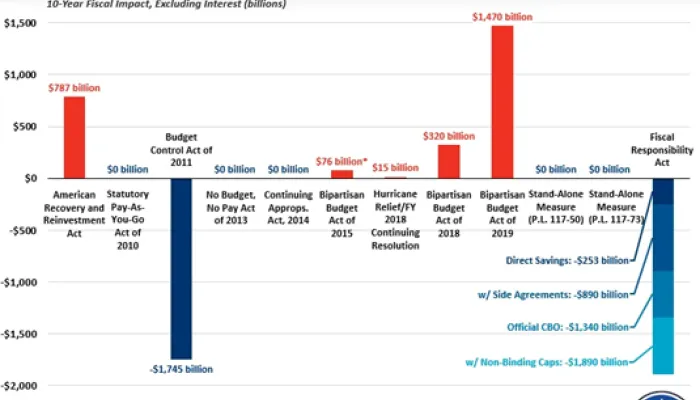The Senate Abandons All Semblance of Fiscal Responsibility
The Senate is expected to vote tomorrow morning on its Fiscal Year (FY) 2025 concurrent budget resolution following the “vote-a-rama” series of amendments. If approved, the reconciliation instructions included in the budget resolution would allow the Senate to write legislation adding up to $5.8 trillion to deficits through FY 2034, including $3.8 trillion of expiring tax policies from assuming a “current policy baseline,” up to $1.5 trillion of new tax cuts or other net borrowing from the Finance Committee, and more than $500 billion of spending increases related to national security, immigration, and energy. It requires just $4 billion of savings.
Reconciliation legislation consistent with these instructions would double the growth of debt as a share of GDP, reaching 134 percent of GDP in 2034 compared to 117 under current law, and would ultimately allow lawmakers to add $45 to $60 trillion to the debt through 2055. Compared to the House’s reconciliation instructions, the Senate’s instructions would allow twice as much borrowing and require only 0.2 percent of the spending cuts and reforms.
The following is a statement from Maya MacGuineas, president of the Committee for a Responsible Federal Budget:
It’s impossible to overstate how destructive this budget proposal could become for our fiscal path and the very foundations of the budget process itself. The Senate is preparing to pass an allowance for the biggest deficit increase ever while sweeping nearly $4 trillion of tax extensions under the rug through a “current policy” gimmick that lets the Chairman of the Budget Committee literally make up numbers.
Even entertaining the notion of allowing $5.8 trillion of deficit increases through a single bill is outrageous enough – it’s more than the borrowing from the American Rescue Plan, TCJA, CARES Act, and bipartisan infrastructure law combined. And in return, they are only requiring $4 billion of spending cuts against $86 trillion of projected spending over the next decade? That’s an unmitigated disgrace.
Given our fiscal trajectory, with debt already as large as our economy and headed for uncharted territory and our interest payments higher than what we’ll spend on our own defense this year, where do senators get the nerve putting this kind of a budget up for debate? The whole point of reconciliation is to bring us closer to fiscal sanity, not to the edge of fiscal calamity.
If we truly allow elected officials to decree the cost of legislation, add more to deficits than ever before, and pretend more than half of it costs nothing, we might as well go all the way and call it like it is: the Senate Borrowing Committee.
The saving grace for America’s fiscal future lies with those lawmakers – House and Senate – willing to stand strong and vote down bills that would explode the debt and destroy the reconciliation process as we know it. The House especially should take the lead – since the Senate clearly won’t – and adjust its own $2.8 trillion of borrowing to instead identify the offsets for new spending, renewed tax cuts, and a down payment on reducing our debt.
###
For more information, please contact Matt Klucher, Assistant Director for Media Relations, at klucher@crfb.org.


